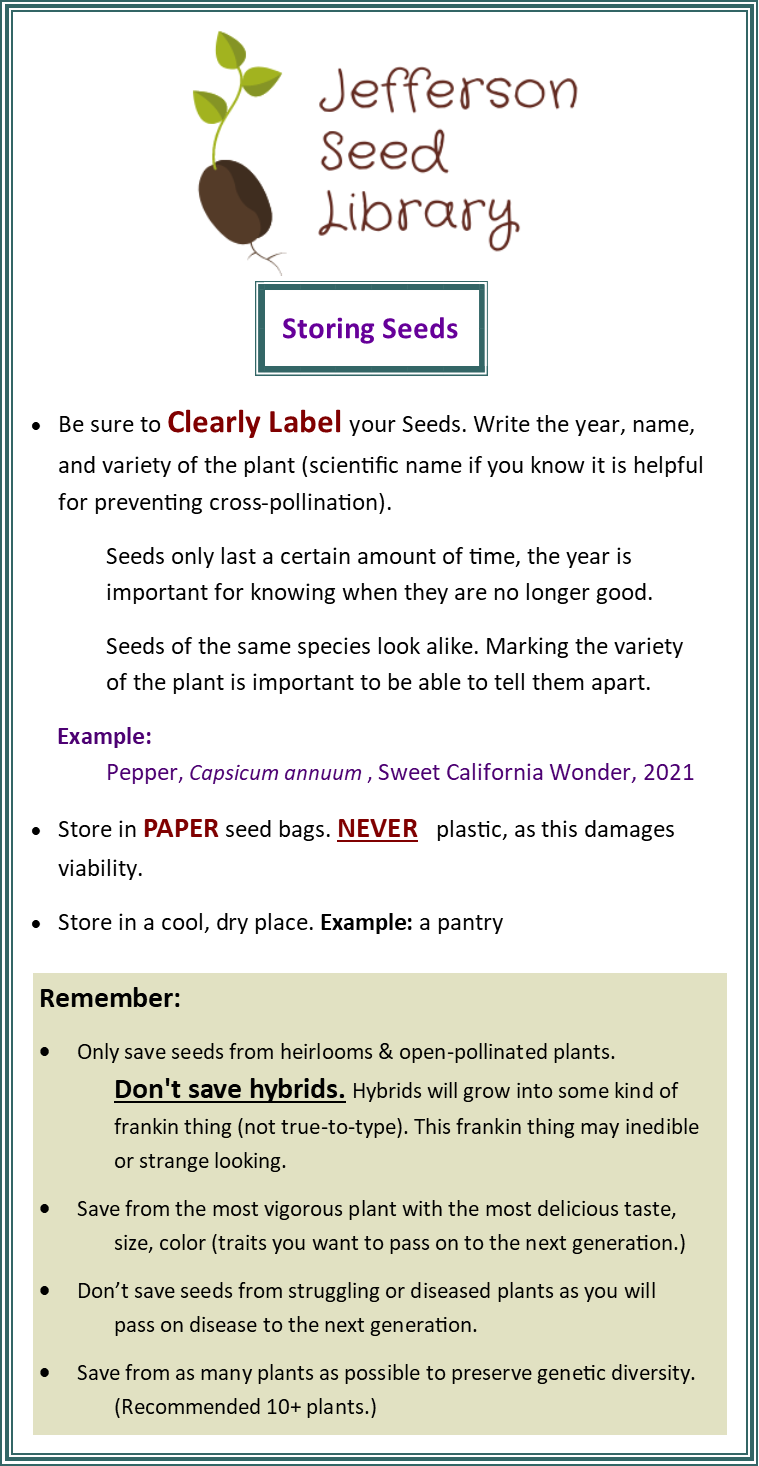
Growing Tips and Seed Saving

Piggy Banks are for Seed Saving
Easy: Great for Beginners! Very little work!
Intermediate: A little more work. May involve threshing to separate seeds from chaff. May also involve isolation/caging to prevent cross-pollination.
Difficult: More work. Involves isolation/caging to prevent cross-pollination. And usually has 3 or more steps to save seeds.
Extreme: Good luck! If you get seeds (in GA), you are awesome!

Leaves are for Growing
Easy: Great for Beginners!
Intermediate: Usually requires more work, such as: pruning, support systems, fungal/disease problems, and/or pests.
Difficult: Just hard to grow in Georgia. It might be hard to start from seed or it might need preparation to mimic winter conditions before sowing.
It might need special care such as: doesn’t like humidity, and/or might need special soil. In addition to things such as: pruning, support systems and/or pests/diseases.
Things to know about edible flowers.
Treat any edible flowers that you plan on eating like any other herb or vegetable in the garden. Avoid using systemic poisons on the plants or nearby soil. Systemic poisons will be absorbed by the plant and distributed throughout the tissues, making the plant poisonous.
How to Cold Stratify
Stratification:
“For seeds that require a chilling period before germination, like some perennials, all you need is a refrigerator and a bag or container filled with perlite, vermiculite, sand, or seed-starting mix. (Mark the seed variety name on the bag.) Moisten the mix, add the seeds, and place in the refrigerator, NOT the freezer. Stratification requirements vary by species. Some plants prefer 2 weeks of cold treatment, some require 2 months or longer. Regardless of the length, never let the seeds dry out during stratification.”
—Starting and Saving Seeds by Julie Thompson-Adolf emphasis added
Cover Crops
Herbs
Vegetables
- Arugula
- Asparagus
- Beans, Asparagus
- Beans
- Bean, Lima
- Beans, Pinto
- Beet
- Bok Choy
- Broccoli
- Brussels Sprout
- Cabbage
- Carrot
- Cauliflower
- Celeriac
- Collards
- Corn
- Popcorn
- Cowpeas/Black-Eyed Peas
- Cucumber
- Eggplant
- Endive
- Gourd, Birdhouse
- Gourd, Luffa
- Kale
- Kohlrabi
- Leek
- Lettuce
- Melon, Musk
- Melon, Bitter
- Melon, Cantaloup
- Jelly Melon
- Mustard
- Mustard Greens
- Mustard, Japanese
- Okra
- Onion
- Parsnip
- Pea
- Pepper
- Pumpkin
- Radish
- Shallot
- Spaghetti Squash
- Spinach
- Squash, Summer
- Squash, Winter
- Swiss Chard
- Tomatillo
- Tomato
- Turnip
- Watermelon
- Wax Melon (Winter Melon)
Annual Flowers
- Alyssum
- Amaranthus
- Aster
- Bachelor Buttons/Cornflower
- Bells of Ireland
- Butterfly Pea
- Calendula
- Celosia/Cockscomb
- Cleome (Spider Flower)
- Coreopsis
- Cosmos
- Daisy
- Daisy, African
- Daisy, Painted
- Gloriosa Daisy
- Gomphrena
- Impatiens
- Lupine
- Marigold
- Mexican Sunflower
- Moonflower
- Morning Glory
- Nasturtium
- Nicotiana
- Pansy
- Petunia
- Phlox
- Poppy
- Portulaca
- Rudbeckia (Black-eyed Susan)
- Salvia
- Snapdragon
- Statice
- Strawflower
- Sunflower
- Sweet Pea
- Venidium
- Zinnia
Perennial or Biennial Flowers
- Agustache
- Balloon Flower
- Bee Balm
- Calendula
- Canturberry Bells
- Carnation
- Chrysanthemum
- Columbine
- Coneflower/Echinacea
- Crinum Lily
- Daisy, Painted
- Daisy, Shasta
- Dianthus
- Forget-Me-Not, Chinese
- Four O’ Clock
- Gypsophila (Baby’s Breath)
- Hibiscus
- Hollyhock
- Lavender
- Lupine
- Milkweed (Butterfly Flower/Weed)
- Pansy
- Rudbeckia (Black-eyed Susan)
- Salvia
- Sweet William
- Tritoma
- Verbascum (common name Mullein)
- Viola
- Yarrow
- Wallflower
Ornamental
Trees and Shrubs

